Twin Peaks Episode 19, “The Black Widow,” is all setups and midgame drama, with the big events of the season yet to come and quite a bit of true weirdness thrown in for good measure. There is an idea that even the worst episode of a great television show is better than the best episode of a bad one. I’m not certain that “The Black Widow” is the worst episode of Twin Peaks—there are a few other options in this stretch of the second season—but it certainly has a few moments that test that maxim. This episode is heavy with style and flourish but without a great deal of payoff. Also, there are some really uneven moments, baffling choices, and long stretches with Little Nicky or James on the run.
All of Twin Peaks Season 2 bounces around through a bunch of plotlines after the big reveal of Laura’s murderer being Leland Palmer (Ray Wise), possessed by BOB. Even though the season is past its midpoint, none of the new plotlines has really jelled yet. The true mysteries of the Black Lodge are still in the future, as are the full machinations of Windom Earle’s (Kenneth Welsh) evil plans. It isn’t the case that Episode 19 has nothing going on, though, it’s just that it all seems a little off from what one would want and expect from the show.
The tone of the show has always been heightened. The acting and direction of the pilot still stand out due to just how spectacularly unusual it is to see anything quite so “unnatural” on TV. That was one of the great innovations that Lynch brought to the series: The show wouldn’t be what it is without that weirdness. But this later era of the show is defined by a strangeness that doesn’t have that early Lynchian tone, and thus often falls short. This is particularly acute in some of the attempts to blend comedy into the darkness.
The Comedy of Errors
There are several pure comedic plotlines in Episode 19, mostly related to Little Nicky (Joshua Harris) and the so-called “Black Widow,” Lana Budding Milford (Robyn Lively). Lana in particular is presented in a supremely odd way. Her literal ability to control the men of the Sheriff’s department certainly has the thematic ideas of a typical Twin Peaks plot, but something about its execution just seems wrong. A lot of that dissonance is in the direction. Caleb Deschanel seems to have given the actors the idea that they should act as though they are in a Pepe Le Pew animated short. The way the men of the Sheriff’s department stare at Lana and follow her around seems to indicate that she is actually being presented as some sort of witch.
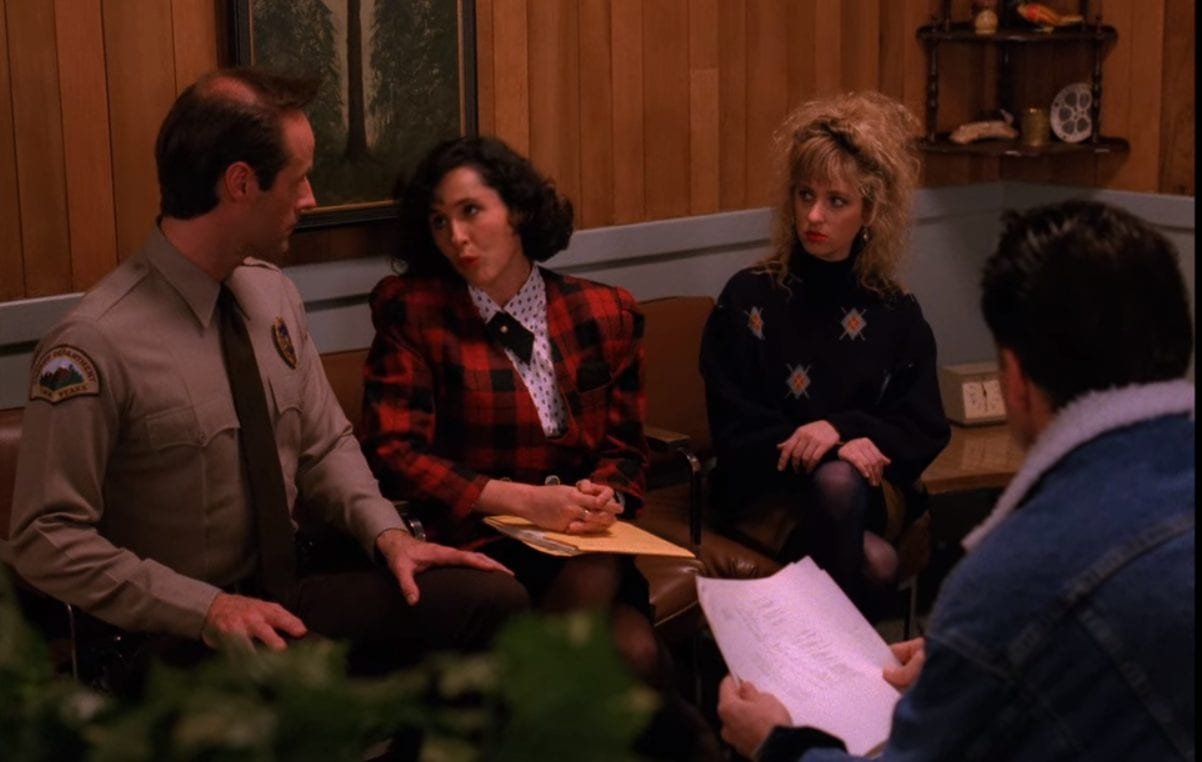
The “Little Nicky” story is just as arch and uninspired. The child certainly could be some sort of demonic spawn—that sort of thing certainly isn’t without precedent in the Peaks universe. But somehow the show both doubles down on the notion and refuses to commit to it. The fact that all of this is also tied to the off-putting business of the “relationship” between Dick Tremayne (Ian Buchanan) and Lucy (Kimmy Robertson) makes it even harder to take. Dick is not a compelling character, and his introduction as a foil to Lucy and Andy’s (Harry Goaz) love story does him no favors.
The only benefit of the Little Nicky plot is that it allows us to be meet his social worker, Judy Swain, who is played by a very young Molly Shannon. Shannon’s comedic chops certainly give her scenes a nice spark, but her presence only increases the oddness of the plotline. Lucy and Andy were always silly characters, and they remain so in their appearances in The Return, but there is something loveable and lovely about the two of them. They are adorable in their weird quirkiness in other episodes, but here they are mostly just weird. Andy also gets saddled with the animated “thought balloon” of Little Nicky as a devil.
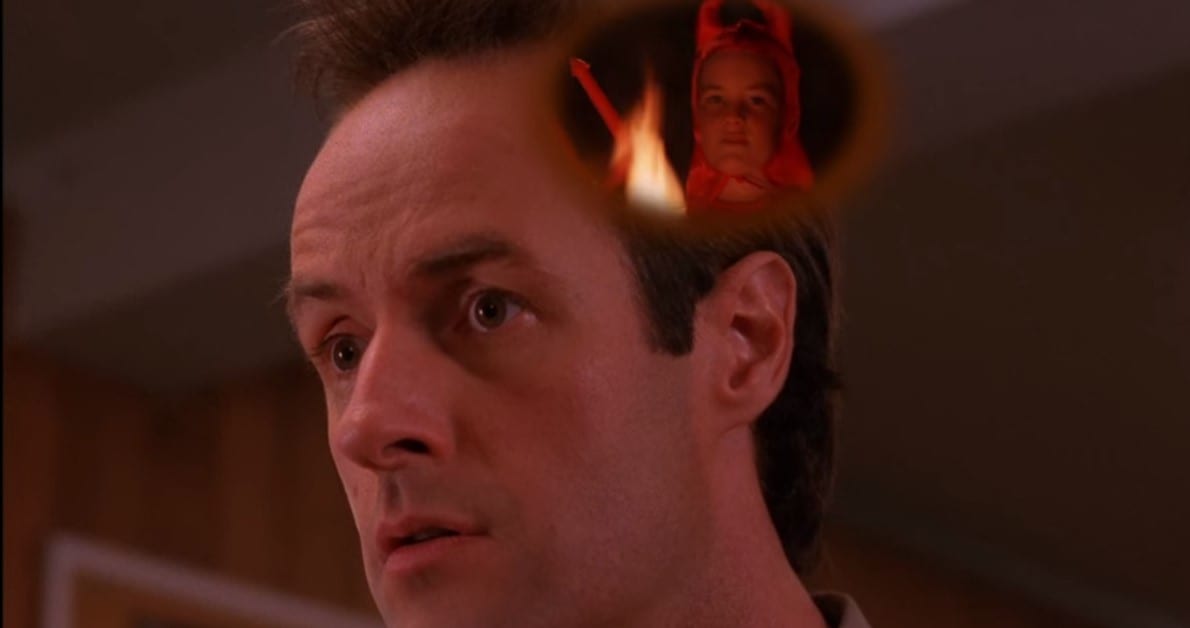
This moment is so out there that in The Essential Wrapped In Plastic, John Thorne [1] calls it the single worst moment in the entire series. It never struck me as being that terrible, but it is weird and just doesn’t fit the tone and style of the rest of the series. According to Kimmy Robertson, she and Goaz were so turned off by the direction the writers set forth for their characters that they both were actively hoping to be written off the show at one point. Thankfully, they weren’t. And Robertson has gone on to become a great ambassador in countless interviews for both the original series and the revival.
Both the Nicky and Lana plots seem to indicate that the show was going to shift into a much more classic “monster of the week” type format. Obviously, this didn’t happen. The rest of Season 2 (and The Return) focuses on an existential dread and the mythology of the Lodges/doppelgangers/Man From Another Place. At least the rest of “Black Widow” focuses on other plots. Though it can definitely be argued that there are too many plots going on, at least they all seem to have the same theme: turning points.
On The Road
One such turning point is with James Hurley (James Marshall). James is off on his own in identity-concealing-sexual-murderous-plot shenanigans with Evelyn Marsh (Annette McCarthy). This plot is pure melodrama, the type of soap opera subplot that the show embraced and inverted. But, as with the comedic plotlines, it just doesn’t quite work.
The issue isn’t the idea of having James out on his own, or with the acting. As with so many couples on the show, Marshall and McCarthy have tremendous chemistry. The issue is once again the tone. It is too slow and too stylized, and not in the way that fits the rest of the show. And the plot itself is so trite and foreseeable that when James comes to his terrible decision, even though we all knew he would do it, it fails completely on a dramatic level.
Plots such as these don’t seem to be from the same universe. The James plot is very much a slow-boiled “noir,” while the Andy-Lucy plot is slapstick, and the Lana plot is pure fantasy. It seems likely the writers of “Black Widow,” Harley Peyton and Robert Engels, were attempting to see if some other formats would work for the show. This manifests itself in many ways, some more reasonable than others. They also seem to be trying to squeeze in a bunch of things that they happen to be fascinated by at the moment. Luckily, one of those interests led to one of the most memorable parts of the entire series—Ben Horne’s Civil War obsession.
The Killer Angels
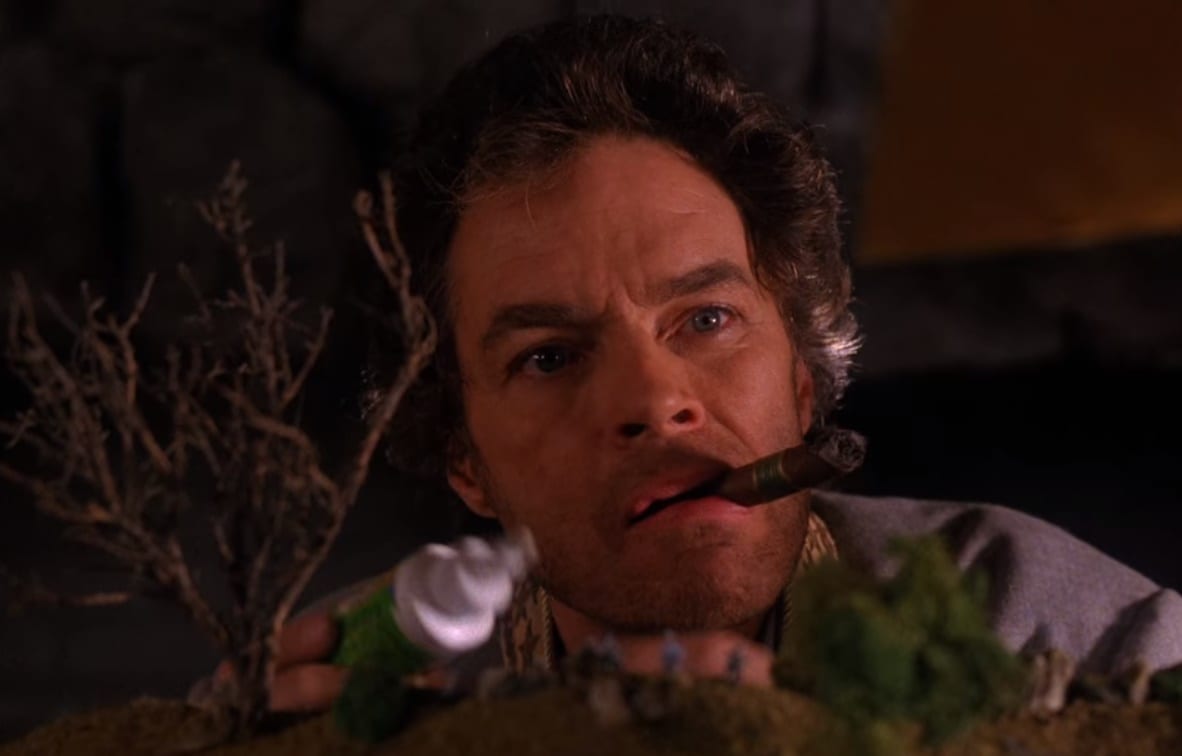
About halfway through Episode 19, Mr. Horne starts to fall into his Confederate madness. Richard Beymer gets to really let out all the stops, as he really gets into Horne’s obsession. Once again, in The Essential Wrapped in Plastic, John Thorne presents an interesting interpretation of what this is all about. According to Thorne, Horne is hoping that by diving into the failures of the Confederacy at Gettysburg he will be able to understand his losses in the present. Ben Horne was once the king of Twin Peaks, but now he has lost nearly every battle. He seems to become more and more unhinged since being thwarted in his machinations by Catherine Martell (Piper Laurie).
All of this is interesting and works for the character, but it is also the case that the Civil War plot was a personal interest of Peyton and Engels. The Civil War: A Film by Ken Burns was released in the fall of 1990, which happened to be the same time that they were working on the script for Episode 19. It seems clear that the writers loved the idea of incorporating the war into the show in some way. It may be that they just got lucky that it actually worked so well as a character beat for Horne.
This plotline will continue over the next several episodes as Horne becomes more and more deranged and Beymer gets wilder and wilder with his acting choices. Of course, the wildest (and most problematic) thing may have been Beymer’s assertion, quoted in Twin Peaks Unwrapped, about a different plotline from the series. This wild quote is his assertion that Cooper and Audrey should have been a couple, “even if she was 12 years old.”
Notes On a Scandal
Episode 19 is indeed also a turning point in the relationship between Agent Dale Cooper (Kyle MacLachlan) and Audrey Horne (Sherilyn Fenn) In classic Peaks form, though, and apparently to the dubious consternation of Beymer, this episode marks the end of the line for this particularly misguided potential relationship. The potential relationship ends here and only lives on in the minds of some of the fans (and apparently a bunch of the creators). MacLachlan’s refusal to allow the relationship to proceed apparently threw off the creative team’s entire plan for the rest of the second season.
This is one of the more fascinating examples of an actor guiding and protecting a character, and from the comments by Peyton and Engels in Twin Peaks Unwrapped [2], they were incredibly upset by it. Peyton in particular really wanted to explore a potential Dale-Audrey relationship and goes so far as to blame MacLachlan’s refusal for some of the show’s ratings failures. It is of course undeniable that the two characters were electric when they shared the screen. The actors were (and are) dynamic, charismatic, and beautiful. But I, like Kyle MacLachlan, believe it would have destroyed the character of Agent Cooper had this relationship gone forward.
Cooper was not a flawed central character like so many of the antiheroes at the center of prestige shows, like Tony Soprano or Don Draper. A relationship like this would have worked for either of them, though certainly wouldn’t have been a thing to emulate. It also would have been fine to explore with plenty of other characters on Twin Peaks. It is the nature of Cooper that makes it so wrong. The character, and MacLachlan’s portrayal, became so indelible through his wonderful sense of logical righteousness. It is clear from the show that Cooper is attracted to Audrey; it isn’t necessary for him to be a saint. But by moving in a different direction, both characters are free to live and love and not to be forced into a gross relationship.
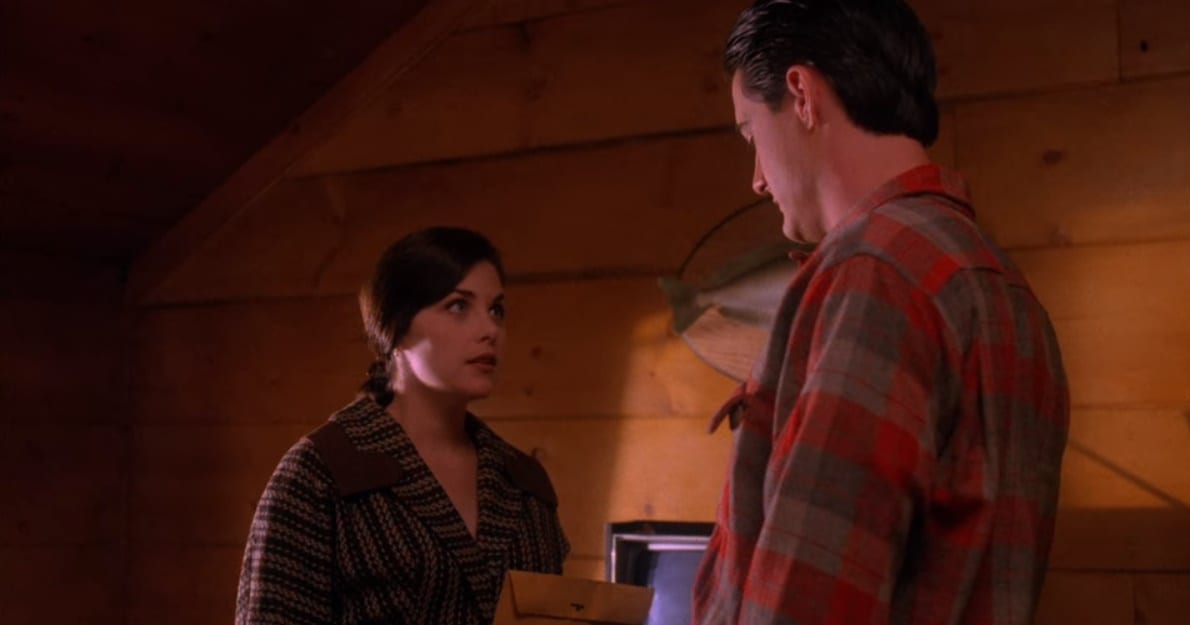
La Cage Aux Folles
And moving Audrey away from the relationship angle and into the “she wants to be an FBI agent” one was just a better story to tell. David Duchovny’s Agent Denise Bryson is a complicated character, and one hard to parse to today’s standards, but she really propels Audrey forward in an interesting way. Denise is a revolutionary character, but as happens in her final scene in “Black Widow,” where she is used as the butt of a transphobic joke, she is often treated in very problematic ways.
The story isn’t about Denise’s gender status but is instead about what it means for Audrey to see a woman in a position of such power and authority. Still, it is also weird that there don’t seem to be any other female FBI agents in the show’s universe. And, yes, there is still some of the “Audrey is doing this to be close to Cooper” plotting involved as well, but because of MacLachlan’s stance, this entire development becomes much more intriguing by making it about Audrey herself instead of her relationship to Cooper.
Even disregarding the relationship and behind-the-scenes drama, Agent Cooper is off his game for most of “The Black Widow.” Things have not been right for him since turning in his badge, which represents so much of his identity (he turns in his signature suit for a large flannel shirt, as well). Despite all of this, we still get some amazing Cooper moments. His detective skills remain unmatched, and he is still engaged in the chess match with Earle, though he is also smart enough to seek out a superior chess player in Pete (Jack Nance) as the match gets more serious (these Pete-Coop scenes also made me think that there was a little bit of Pete in Dougie Jones, but that is a different analysis entirely). Cooper also actually gets emotional in his tape to Diane. I’m not sure if that is part of him being off his game, but it is certainly notable.
Point of No Return
Also notable is the last and best scene in the episode. Bobby Briggs (Dana Ashbrook) is many things over the course of the series, many of them not very nice, but it is amazing to see him be the one thing we would never expect in this scene—a loving son. Despite all the issues, it seems the Briggs family actually loves each other. Betty’s (Charlotte Stewart) love for the missing Major Briggs (Don Davis) is palpable and gives the moment when the Major reappears an unexpected emotional heft.
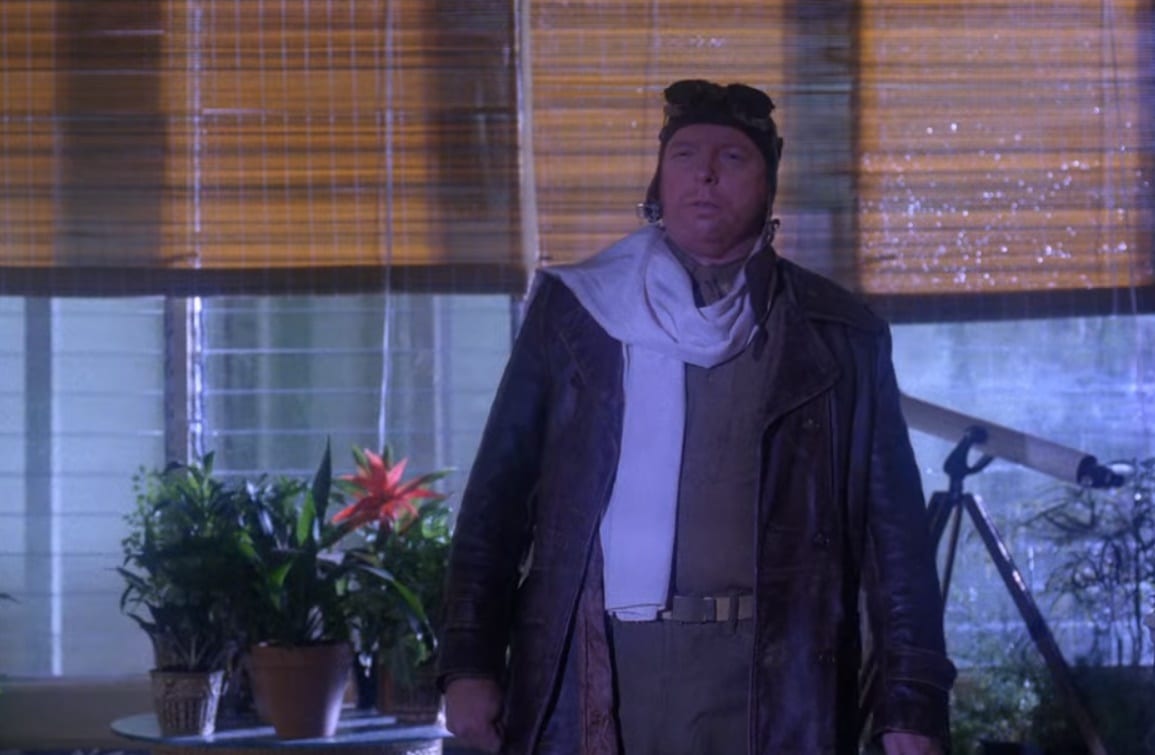
The Essential Wrapped in Plastic refers to Episode 19 as a near-total disaster, but is any episode of Twin Peaks really that? There are so many great little nuggets to digest, both about the ongoing mysteries and the characters. This midseason run has the show at a crossroads, though: its most interesting mystery is in the past, and its best mythological explorations are in the future. The characters remain unique and compelling, but the plots themselves will take a few more episodes to re-establish themselves. As “The Black Widow” ends, though, the future is upon us. Major Briggs has returned, and Agent Cooper is creeping ever closer to his date with destiny and, eventually, 25 years in another place.
[1] Thorne, John. The Essential Wrapped in Plastic: Pathways to Twin Peaks. Dallas, TX: John Thorne, 2016.
[2] Ben Durant and Bryon Kozaczka, Twin Peaks Unwrapped, 2020.

